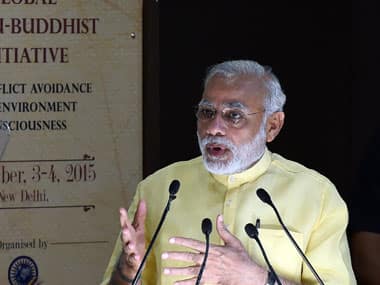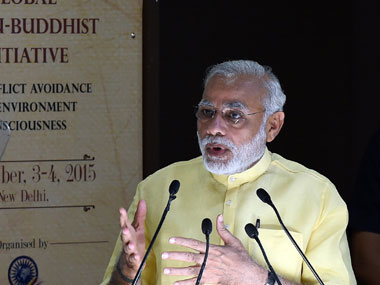Contrary to the negative perception going around in a section of the media, the foreign policy of Prime Minister Narendra Modi has been “truly dynamic and imaginative” and the steps taken by the new dispensation at the Centre for the economic growth of the country have been “wonderful”, believe experts in economic and foreign affairs. “Prime Minister Narendra Modi’s handling of an imaginative and dynamic foreign policy has been a big surprise of his first year in office,” said Rajiv Sikri, a former diplomat who retired in 2006 as secretary in the Ministry of External Affairs. “With no previous direct experience in foreign affairs, and an electoral mandate for domestic reforms and economic growth, Modi was not expected to have an activist foreign policy,” he added. He was speaking at a function at the launch of the book ‘Redefining Governance: Essays on One Year of Modi Government’ at the India International Centre in New Delhi on Wednesday. Elaborating the point further in an article - The India-Bangladesh land boundary agreement: Historic milestone in PM Modi’s ’neighbourhood first’ foreign policy -in the book, he writes: “Modi has led from the front in selling India to the rest of the world with the message that India is ready and willing to actively engage with the rest of the world and has laid out a welcome mat to both businessmen and tourists….The prime minister has not approached the world from a position of weakness or as a supplicant. Rather, he has shown a high level of self-confidence and ambition in envisaging India as a ‘leading power’, not just a balancer”. Referring to Modi’s initiative to invite leaders of neighbouring countries to his swearing-in ceremony in May 2014, the ex-diplomat writes, “Modi signalled the high priority his government attaches to India’s neighbours. He also made it clear that Delhi would determine India’s foreign policy and would not give in to pressures from regional parties pursuing their narrow agendas.” Sikri justifies Modi’s apparent policy of minimum engagement with Pakistan. [caption id=“attachment_2420816” align=“alignleft” width=“380”]
 Narendra Modi. AFP.[/caption] On Modi’s efforts to revive the economy, S Gurumurthy, well-known chartered accountant, who is also a visiting faculty at IIT-Bombay and research professor of legal anthropology at SASTRA University in Tamil Nadu, was all praise for the concept of MUDRA Bank. It had theoretical depth and practical wisdom, he said. He elaborates it in the chapter titled ‘MUDRA Bank: Theoretical Depth and Practical Wisdom’. “When Modi took over the nearly ruined economy from the Congress-led United Progressive Alliance (UPA), he immediately recognised the urgent and unattended financial needs of millions of unfunded micro units. Because he was not convinced that the existing financial institutions would fund these unfunded micro business, which he must have understood as the backbone of job creation in India, Modi went ahead with what he thought would work for India. “The result is the birth of MUDRA bank idea in the Budget 2015-16. Backgrounding the MUDRA Bank, the Finance Minister emphasised ‘inclusive growth’ has to come from only the non-formal sector, without saying the corporate sector cannot do it…he proposed MUDRA Bank for funding the unfunded business”. In another chapter, ‘One Year of Modi Government: Economy and Pointers’, Professor R Vaidyanathan of the IIM-Bangalore argues that it is difficult to access the economic performance of any government within a period of one year. Particularly, since after more than two decades India got a government with a single party majority. “Congress and other socialist parties by and large followed what is called the Nehruvian paradigm of economic growth. It involved acceptance of the state control of commanding heights of the economy; state providing doles/subsidies to weaker sections and entrepreneurs being looked at with suspicion,” he writes, adding that in any economic performance, evaluation experts use measures like GDP growth/inflation/savings etc. We feel one year is too short a period to use such measures since in a vast country like India, policy transmission to remote parts takes time and also many of the new developments take place over time since for more than 60 years we have adopted a socialist pattern of society”. The defence section of the book has highlighted the role of armed forces in disaster relief and humanitarian assistance in the year 2014-15, performance of the Modi government in the realm of national security, new zeal for India’s defence preparedness and nuclear policy of the Modi government. It also mentions of the Centre’s initiatives like Swachch Bharat Abhiyan and new initiatives in education for nation building. Edited by Anirban Ganguly, director, Dr Syama Prasad Mukherjee Research Foundation, the book, a collection of articles , has its foreword written by Bharatiya Janata Party (BJP) president Amit Shah.
Narendra Modi. AFP.[/caption] On Modi’s efforts to revive the economy, S Gurumurthy, well-known chartered accountant, who is also a visiting faculty at IIT-Bombay and research professor of legal anthropology at SASTRA University in Tamil Nadu, was all praise for the concept of MUDRA Bank. It had theoretical depth and practical wisdom, he said. He elaborates it in the chapter titled ‘MUDRA Bank: Theoretical Depth and Practical Wisdom’. “When Modi took over the nearly ruined economy from the Congress-led United Progressive Alliance (UPA), he immediately recognised the urgent and unattended financial needs of millions of unfunded micro units. Because he was not convinced that the existing financial institutions would fund these unfunded micro business, which he must have understood as the backbone of job creation in India, Modi went ahead with what he thought would work for India. “The result is the birth of MUDRA bank idea in the Budget 2015-16. Backgrounding the MUDRA Bank, the Finance Minister emphasised ‘inclusive growth’ has to come from only the non-formal sector, without saying the corporate sector cannot do it…he proposed MUDRA Bank for funding the unfunded business”. In another chapter, ‘One Year of Modi Government: Economy and Pointers’, Professor R Vaidyanathan of the IIM-Bangalore argues that it is difficult to access the economic performance of any government within a period of one year. Particularly, since after more than two decades India got a government with a single party majority. “Congress and other socialist parties by and large followed what is called the Nehruvian paradigm of economic growth. It involved acceptance of the state control of commanding heights of the economy; state providing doles/subsidies to weaker sections and entrepreneurs being looked at with suspicion,” he writes, adding that in any economic performance, evaluation experts use measures like GDP growth/inflation/savings etc. We feel one year is too short a period to use such measures since in a vast country like India, policy transmission to remote parts takes time and also many of the new developments take place over time since for more than 60 years we have adopted a socialist pattern of society”. The defence section of the book has highlighted the role of armed forces in disaster relief and humanitarian assistance in the year 2014-15, performance of the Modi government in the realm of national security, new zeal for India’s defence preparedness and nuclear policy of the Modi government. It also mentions of the Centre’s initiatives like Swachch Bharat Abhiyan and new initiatives in education for nation building. Edited by Anirban Ganguly, director, Dr Syama Prasad Mukherjee Research Foundation, the book, a collection of articles , has its foreword written by Bharatiya Janata Party (BJP) president Amit Shah.
Modi’s foreign policy is imaginative and truly dynamic: Former diplomat
Tarique Anwar
• September 4, 2015, 10:18:43 IST
Contrary to the negative perception going around in a section of the media, the foreign policy of Prime Minister Narendra Modi has been “truly dynamic and imaginative”, said a former diplomat.
Advertisement
)
End of Article